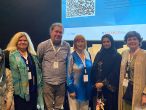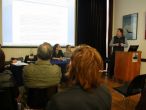Convergence: heritage economies and potentialities in South East Europe (lecture by Sanjeev Shankar)
Time: 7th October, 11:00 am
Place: the Ethnographic Museum of Zagreb, Trg Mažuranića 14
ICOM Croatia and the Ethnographic Museum in Zagreb are pleased to announce
LECTURE by Sanjeev Shankar
Convergence: heritage economies and potentialities in South East Europe
Abstract:
“Critically acclaimed architect, designer and scientist Sanjeev Shankar explores a radical and convergent agenda for ‘heritage’ in the 21st century. In his search for answers to some of the toughest questions facing humankind, Sanjeev proposes a new role and relevance for memory and history – suggesting a substantial and essential shift in the way we perceive, believe, prioritize and act on this planet. The talk will share Mr. Shankar’s transformative journey of immersion and inclusion over the last decade to provoke an open dialogue for revitalizing and repositioning the ‘cultural heritage’ of South Eastern Europe. Using the lens of radical imagination, entrepreneurship and field research the talk will nurture a critical dialogue for convergence and inspire all participants to rethink and redefine the relevance and value of ‘memory’ in the 21st century.”
Short bio:
Sanjeev Shankar was born in the Nilgiri hills of Southern-India. As founder of a transdisciplinary creative studio, Sanjeev uses his training in design, science and architecture to merge traditional crafts-based knowledge with contemporary cultural and technological patterns to develop socially responsible and life enhancing solutions. Over the last decade, he has inspired and galvanized communities globally by walking the thin, exciting line between restraint and risk. Through revolutionary leadership, rigorous field research and experimentation, and an inclusive hands-on methodology, he continues to explore a critical and collective agenda for human ingenuity, challenging the way we live and impact our planet. A recipient of the Chevening fellowship for Science and Technology from Britain and the DAAD fellowship from Germany, his critically acclaimed works have featured at the Royal Institute of British Architects in London; Centre for Architecture in New York; Hyde Park Art Center in Chicago and the Doors of Perception in New Delhi. He was shortlisted for the Emerging Architecture award at the Royal Institute of British Architects in London and has won the “10 Great Ideas to change the world” project, a global initiative focussed on revitalizing the planet by the Indian Institute of Technology Bombay.






